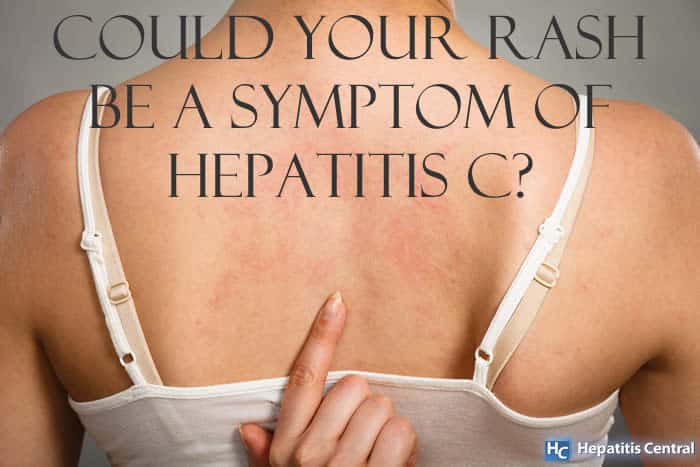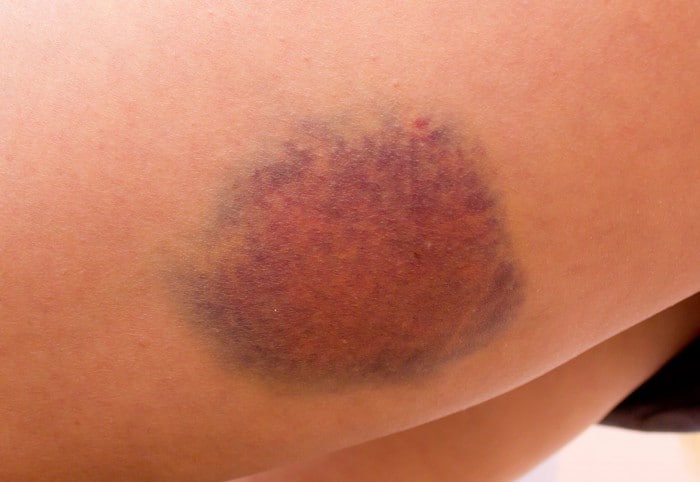Hep C Symptoms – Could Your Rash Be One?


At one point or another, most people have experienced some degree of skin itchiness. However, many are unaware that a persistent rash without a logical explanation could be a sign of Hepatitis C infection. Understanding the rash pattern and additional symptomatology can help identify if your rash is a symptom of Hepatitis C.
About Hepatitis C
A contagious virus that affects the liver, Hepatitis C is spread through contaminated blood. A majority of Hepatitis C infections lead to chronic liver disease – which can go undetected for decades until symptoms emerge. Although the Hepatitis C virus targets your liver, it can cause problems in other areas of the body, such as your skin.
Skin rashes may be a sign of Hepatitis C, and should always be evaluated by a competent healthcare practitioner. If you are one of the estimated 4 million Americans with Hepatitis C, an untreated rash could be a sign of progressive liver damage. Besides eliminating the virus from your bloodstream, taking medicine to treat Hepatitis C can clear up related skin rashes.
5 Early Hep C Symptoms
For some, there is an acute stage of Hepatitis C infection. Easily mistaken for the flu, early hep c symptoms typically include:

- Fever and fatigue
- Dark urine and light stool
- Abdominal pain
- Jaundice (yellowing of the eyes and skin)
- Rash
Typically lasting six months or less, acute Hepatitis C can cause red, itchy rashes. Urticaria, otherwise known as hives, is the most common rash in acute Hepatitis C. Hives can also be the result of an allergic reaction, appearing as widespread, itchy, swollen, red rashes on the skin. Whether a result of an allergy or acute Hepatitis C, urticaria typically comes in round patches and lasts for several hours.
Chronic Hepatitis C
Of those infected with the virus, approximately 85 percent will go on to develop chronic Hepatitis C. Unfortunately, symptoms of the chronic version rarely emerge until severe liver damage has occurred. Signs of liver damage from chronic Hepatitis C may manifest as a skin problem.
4 Symptoms on Your Skin
- Redness or brown patches
- Spider veins
- Severe itching in one area
- Patches of very dry skin
Additional symptoms that could point towards advanced liver disease include:

- Fatigue and low appetite
- Upset stomach or abdominal pain
- Joint and muscle pain
- Jaundice
- Dark yellow urine
- Bleeding or bruising easily
4 Hepatitis C Rashes
Because they can be due to many different causes, rashes are challenging to diagnose. Nonetheless, when someone has chronic Hepatitis C, a new rash always raises suspicion. Although not exclusive, areas typically impacted by a Hepatitis C-related rash include chest, arms and torso.
Chronic Hepatitis C can also lead to some other types of rashes:
- Pruritus – is the sensation of being itchy without a visible cause. Pruritus can be severe and very frustrating, sometimes localized to the hands and feet, or it can be widespread. Some people report feeling like their internal organs are itching. Pruritus may become so uncomfortable and unrelenting that sufferers develop suicidal ideation. Read 10 Tips to Relieve HCV-Related Itching.
- Lichen Planus – can be white and patchy or scaly and may be on the scalp, skin, mouth, nails, and genitals. It may resemble extremely dry skin or eczema. For others, Lichen Planus appears as purplish bumps that typically start on the wrist, but can pop up anywhere.
- Purpura – also known as blood spots, these red or purple blotches can be as small as a pinhead or as big as half an inch. Often causing itching or pain, purpura is usually a sign of cryoglobulinemia in those with Hepatitis C. Cryoglobulinemia is a blood vessel problem where proteins in the blood stick together in cold weather.
- Porphyria cutanea tarda (PCT) – causes painful blisters and fragile skin that worsens in the sunshine. PCT occurs when proteins (porphyrins) build up in the liver and then move into the bloodstream.
In reference to Hepatitis C, skin rashes may be attributed to the disease itself, manifestations of the disease, or treatments intended to eliminate the virus.
Self-diagnosis for a skin rash can be very difficult. Despite the information described above and images easily found in an internet search, seeing a medical doctor for a skin rash is strongly encouraged. Only a qualified professional can determine the underlying cause of a rash and advise treatment to clear it up. Even emergency room doctors refer most rashes to a dermatologist!
However, knowing that you have Hepatitis C could help you recognize an associated rash quickly. On the contrary, those suffering with a rash might want to consider getting tested for the Hepatitis C virus.
https://hepatitisc.net/living/pruritus/, Pruritus in Hepatitis C: Tips to help with itching, Susan Simon, Retrieved September 16, 2018, Health Union, LLC, 2018.
https://hepatitisc.net/living/rash/, Hepatitis C Rash, Jenelle Marie Pierce, Retrieved September 16, 2018, Health Union, LLC, 2018.
https://www.healthline.com/health/your-rash-caused-by-hepatitis-c#talk-with-your-doctor, Is Your Rash Caused by Hepatitis C?, Retrieved September 16, 2018, Healthline Media, 2018.
https://www.webmd.com/hepatitis/chronic-hepatitis-c#1, Chronic Hepatitis C: The Basics, Retrieved September 16, 2018, WebMD, LLC, 2018.
https://www.webmd.com/hepatitis/hepatitis-c-skin-problems#1, Hepatitis C and Your Skin, Retrieved September 16, 2018, WebMD, LLC, 2018.







